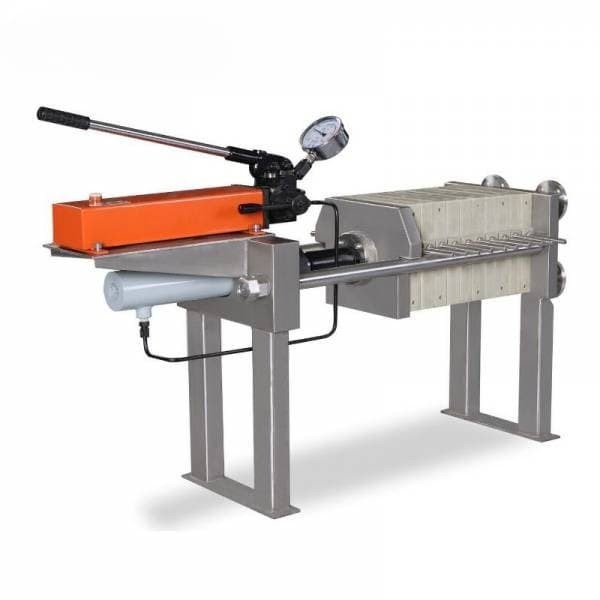
Sieving Machine
Hydraulic Diaphragm Lab Filter Press for Laboratory Filtration
Item Number : KH-01
Price varies based on specs and customizations
- Size
- 150*150 to 630*630 mm
- Cake thickness
- 10 to 30 mm
- Max. Filter pressure
- 10 bar
- Max. Filter temprature
- 90 ℃
Shipping:
Contact us to get shipping details Enjoy On-time Dispatch Guarantee.
Why Choose Us
Easy ordering process, quality products, and dedicated support for your business success.
Introduction
Hydraulic diaphragm lab press filter is one type lab scale filter press, it takes small footprint, and higher pressing power.
- Filter area: 0.5-5 square meters
- Filter pressure: 0.5-1.2Mpa
- Filter plates: 6 pcs
Applications
The Hydraulic Diaphragm Lab Filter Press is a versatile tool used in various fields for solid-liquid separation processes. This equipment is particularly beneficial in settings where precise control and efficiency are paramount. Its applications span across multiple industries, including research and development, quality control, and small-scale production. Here are the main application areas of the Hydraulic Diaphragm Lab Filter Press:
- Research and Development: In laboratories, this filter press is utilized to explore and test the filtration properties of new materials or to refine existing filtration processes. It aids in the development of new products and technologies by providing accurate and reliable data on filtration efficiency and capacity.
- Quality Control: Within quality control settings, the filter press plays a crucial role in ensuring that products adhere to specific filtration standards. It helps in identifying and resolving any issues related to the filtration process, thereby maintaining product quality and consistency.
- Small-scale Production: For industries requiring small-scale production of goods that necessitate solid-liquid separation, such as pharmaceuticals or food products, this filter press offers a compact and efficient solution. It enables the production of high-quality products in controlled environments, ensuring that the filtration process meets stringent requirements.
These applications highlight the critical role of the Hydraulic Diaphragm Lab Filter Press in advancing scientific research, maintaining product quality, and facilitating small-scale production processes across various sectors.
Features
Hydraulic diaphragm lab press filter is one type lab scale filter press, it takes small footprint, and higher pressing power.
- Manual Hydraulic Control: Features a manual hydraulic hand pump with a reservoir and hydraulic cylinder, allowing for precise control of the closing force.
- High Closing Force: Capable of exerting a force of up to 4000 psig, ensuring efficient and effective pressing operations.
- Locking Mechanism: Includes a locking ring on the cylinder to mechanically maintain press closure, enhancing safety and stability during operations.
- Frontal Piping System: Equipped with bolt-on headers and a center feed with four corner filtrate outlets, facilitating easy setup and operation.
- Recessed Chamber Plates: Utilizes standard center feed recessed chamber filter plates with barrel-neck type cloths, ensuring effective filtration.
- Durable Construction: Hardened steel construction with an all-in-one leak-free design, providing durability and reliability in laboratory settings.
- Safety and Accessibility: Includes a Perspex safety guard and a long, easy-to-use handle, enhancing safety and ease of operation.
- Accurate Monitoring: Features an accurate pressure gauge, allowing for precise monitoring and adjustment of hydraulic pressure during operations.
Feed tank, pumps, valves and fitting can be designed in one complete unit.
Detail & Parts
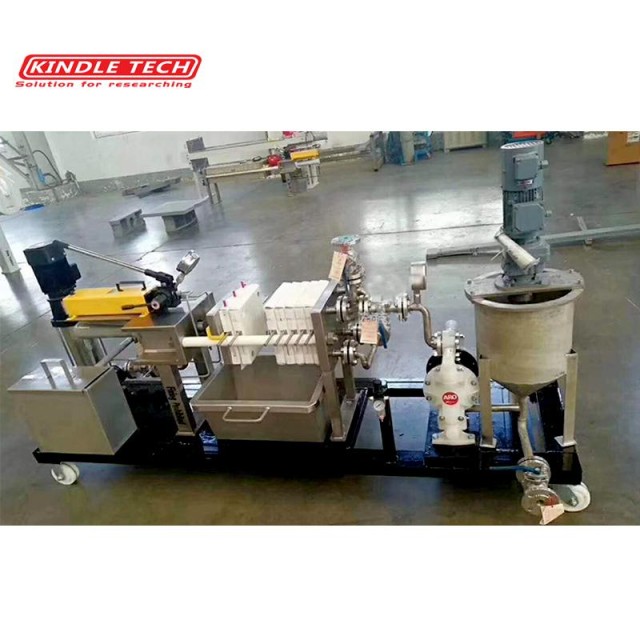
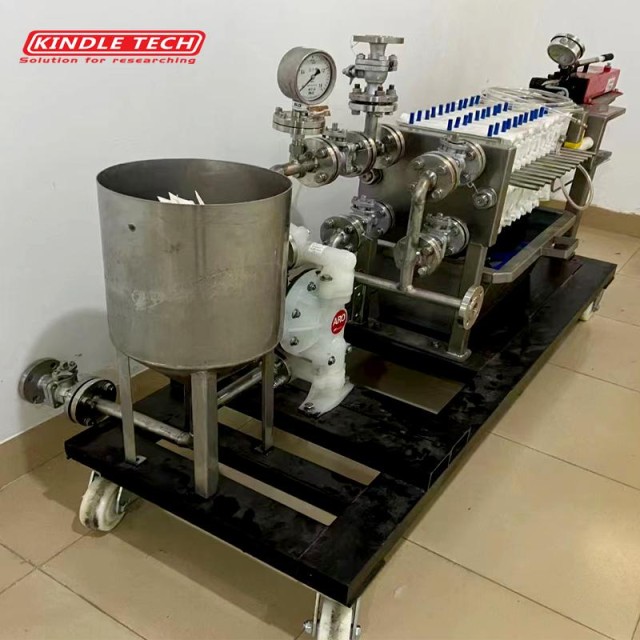
Advantages
The Hydraulic Diaphragm Lab Filter Press offers a range of advantages that make it an essential tool in various laboratory settings, including research and development, quality control, and small-scale production. Here are the key benefits:
- Adjustable Top Pressing Surface: This feature allows for precise control over the filtration process, ensuring optimal results for different materials and applications.
- Perspex Safety Guard: Enhances safety by providing a clear view of the filtration process while preventing accidental contact with moving parts.
- Long Easy-to-Use Handle: Facilitates smooth operation, reducing operator fatigue and ensuring consistent pressure application.
- Accurate Pressure Gauge: Enables accurate monitoring of the pressure applied during filtration, crucial for maintaining quality and consistency in the process.
- Hardened Steel Construction: Ensures durability and longevity, making the filter press suitable for continuous use in demanding laboratory environments.
- All-in-One Leak-Free Design: Prevents leaks and ensures a clean, efficient filtration process, minimizing contamination risks and maintenance needs.
- Hydraulic Working Principle: Utilizes a hydraulic system composed of oil tanks, hydraulic pumps, hydraulic cylinders, electric motors, and oil pipes. This system efficiently transfers hydraulic oil into the hydraulic cylinder, driving the mechanical movement necessary for effective solid-liquid separation.
- Versatility in Material Science Labs: Ideal for pressing pellets, lamination, and punching electrodes, making it a versatile tool in material science labs.
- Cost-Effectiveness**: Despite its advanced features, the manual filter press is cost-saving with no power consumption, reducing operational costs significantly.
- Wide Range of Models and Filter Areas: Available in various sizes (320mm, 450mm, 630mm) with filter areas ranging from 1-40m², accommodating diverse filtration needs.
These advantages collectively highlight the Hydraulic Diaphragm Lab Filter Press's effectiveness and efficiency in laboratory settings, making it a valuable investment for any lab involved in solid-liquid separation processes.
Technical specifications
| Size | 150*150 to 630*630 mm |
| Cake thickness | 10 to 30 mm |
| Filter Press Chamber volume capacity | 0.1 to 300 L |
| Max. Filter pressure | 10 bar |
| Max. Membrane Squeezing pressurer | 12 bar |
| Max. Filter temprature | 90 ℃ |
| Filter press plate type | chamber plate,CGR plate,membrane plate etc. |
| Filter Press Filter plate feeding type | Center feeding,corner feeding etc. |
| Filtrate discharge way | Open or Close type |
| Cake washing type | washable or non-washable type |
| Filter press Compressing type | Automatic hydraulic,hydraulic jack etc. |
| Filter press plate shifting type | Manual operation,Automatic plate shifted one by one etc. |
| Filter plate material | PP, FRPP |
| Membrane material | PP,Rubber |
| Filter Press Frame material | Carbon steel paint antisepsis, SS304/316 etc. |
| Filter Feed/Liquid tube material | PP, SS304/316 etc. |
| Motor brand of hydraulic pump | ABB |
| reducer brand of plate shifting | SEW |
| reducer brand of cloth washing | SEW |
| Filter press cloth material | PP,PE,,Nylon etc. filter press cloth included for different testing purpose |
| Filter press feed pump | different filter press feeding pump,such as Air diaphragm pump,small screw pump or other small capacity pump for feeding |
Warnings
Operator safety is the top important issue! Please operate the equipment with cautions. Working with inflammable& explosive or toxic gases is very dangerous, operators must take all necessary precautions before starting the equipment. Working with positive pressure inside the reactors or chambers is dangerous, operator must fellow the safety procedures strictly. Extra caution must also be taken when operating with air-reactive materials, especially under vacuum. A leak can draw air into the apparatus and cause a violent reaction to occur.
Designed for You
KinTek provide deep custom made service and equipment to worldwide customers, our specialized teamwork and rich experienced engineers are capable to undertake the custom tailoring hardware and software equipment requirements, and help our customer to build up the exclusive and personalized equipment and solution!
Would you please drop your ideas to us, our engineers are ready for you now!
Trusted by Industry Leaders

FAQ
What Is A Lab Press?
What Are Laboratory Hydraulic Machines?
What Is The Purpose Of A Hydraulic Press In Lab?
What Are The Advantages Of Using Laboratory Hydraulic Machines?
What Are Different Type Of Lab Presses?
What Are The Applications Of Laboratory Hydraulic Machines?
What Are The Main Components Of A Laboratory Hydraulic Machine?
What Considerations Should Be Taken When Selecting A Laboratory Hydraulic Machine?
4.8 / 5
The lab filter press is a great tool for our research. It's easy to use and provides accurate results.
4.9 / 5
This filter press is a valuable asset to our lab. It's efficient and helps us save time and resources.
4.7 / 5
We've been using this filter press for a few months now and it has exceeded our expectations. It's durable and produces high-quality filtrates.
4.8 / 5
The customer service from KINTEK SOLUTION is exceptional. They are always ready to assist and provide prompt solutions to any queries.
4.9 / 5
The filter press is technologically advanced and user-friendly. It has simplified our filtration process and improved our productivity.
4.7 / 5
We are very satisfied with the quality of the filter press and the support provided by KINTEK SOLUTION. Highly recommend!
4.8 / 5
The filter press arrived quickly and was well-packaged. It's a great value for money and has met all our filtration needs.
4.9 / 5
The filter press is easy to operate and maintain. It has significantly improved the efficiency of our filtration process.
4.7 / 5
We've been using this filter press for over a year now and it has proven to be a reliable and durable piece of equipment.
4.8 / 5
The filter press is compact and takes up minimal space in our lab. It's a great choice for small-scale filtration applications.
4.9 / 5
The filter press is versatile and can handle a wide range of filtration tasks. It's a valuable addition to our lab equipment.
4.7 / 5
The customer service from KINTEK SOLUTION is excellent. They are knowledgeable and always willing to help.
4.8 / 5
The filter press is technologically advanced and features the latest filtration technology. It's a great investment for our lab.
4.9 / 5
We are very satisfied with the quality of the filter press and the support provided by KINTEK SOLUTION. Highly recommend!
4.7 / 5
The filter press arrived quickly and was well-packaged. It's a great value for money and has met all our filtration needs.
4.8 / 5
The filter press is easy to operate and maintain. It has significantly improved the efficiency of our filtration process.
4.9 / 5
We've been using this filter press for over a year now and it has proven to be a reliable and durable piece of equipment.
4.7 / 5
The filter press is compact and takes up minimal space in our lab. It's a great choice for small-scale filtration applications.
REQUEST A QUOTE
Our professional team will reply to you within one business day. Please feel free to contact us!
Related Products

Laboratory Manual Hydraulic Pellet Press for Lab Use
Efficient Manure Lab Hydraulic Press with Safety Cover for sample preparation in material research, pharmacy, and electronic industries. Available in 15T to 60T.

Laboratory Vertical Water Circulating Vacuum Pump for Lab Use
Looking for a reliable water circulating vacuum pump for your lab or small-scale industry? Check out our Vertical Water Circulating Vacuum Pump with five taps and a larger air sucking amount, perfect for evaporation, distillation, and more.
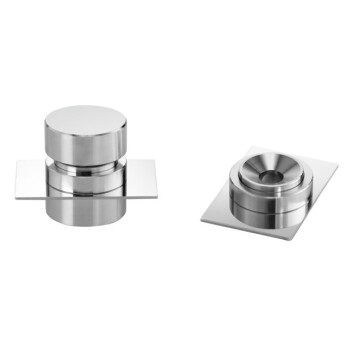
No Demolding Lab Infrared Press Mold for Laboratory Applications
Effortlessly test your samples with no demolding required using our lab infrared press mold. Enjoy high transmittance and customizable sizes for your convenience.

Laboratory Benchtop Water Circulating Vacuum Pump for Lab Use
Need a water circulating vacuum pump for your lab or small-scale industry? Our Benchtop Water Circulating Vacuum Pump is perfect for evaporation, distillation, crystallization, and more.

Platinum Sheet Electrode for Laboratory and Industrial Applications
Elevate your experiments with our Platinum Sheet Electrode. Crafted with quality materials, our safe and durable models can be tailored to fit your needs.
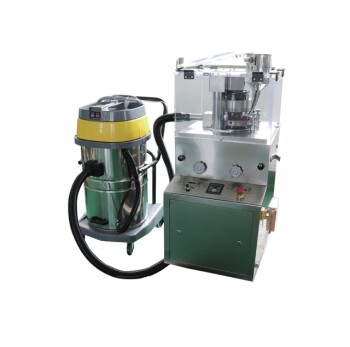
Lab Scale Rotary Single Punch Tablet Press Machine TDP Tablet Punching Machine
This machine is a single-pressure automatic rotating, continuous tableting machine that compresses granular raw materials into various tablets. It is mainly used for tablet production in the pharmaceutical industry, and is also suitable for chemical, food, electronics and other industrial sectors.

Rubber Vulcanizer Vulcanizing Machine Plate Vulcanizing Press for Lab
The Plate vulcanizing press is a kind of equipment used in the production of rubber products, mainly used for the vulcanization of rubber products. Vulcanization is a key step in rubber processing.
Related Articles

Understanding Filter Press: Function, Components, and Applications
A filter press is a piece of equipment used in liquid/solid separation. It separates liquids and solids using pressure filtration. The slurry is pumped into the filter press and is dewatered under pressure. The design of the filter press is based on the volume and type of slurry that needs to be dewatered. There are various configurations of filter presses available, including sidebar automatic, manual overhead, automatic dual overhead beam, stainless steel clad, explosion-proof filter presses, vacuum filter presses, and hand filter presses.

Comparative Analysis of Laboratory Filter Presses and Industrial-Scale Filter Presses
Laboratory filter presses and industrial-scale filter presses are both essential tools used in various industries. While laboratory filter presses are designed for smaller-scale applications, industrial-scale filter presses are built to handle larger volumes.

Manual Hydraulic Presses for Laboratory Use: A Comprehensive Guide
Explore the intricacies of manual hydraulic presses in labs, including operation, benefits, and comparison with automatic models. Ideal for those seeking detailed insights on sample preparation and cost-effectiveness.

Applications and Importance of Hydraulic Press in Laboratories
A hydraulic press is a machine that uses the pressure generated in a confined fluid to configure metals, plastics, rubber, and other materials. Its operation is governed by Pascal’s principle, which states that pressure applied to a confined fluid is transmitted unaltered throughout the fluid.

Understanding Hydraulic Pellet Press: Working Mechanism and Applications
A hydraulic press, also known as a Bramah press, is a machine that uses fluid pressure to generate a force. This force can be used to compress or mold materials. Hydraulic presses are commonly used in manufacturing and industrial applications due to their ability to exert a large amount of force while still being easy to operate.

The Science Behind Hydraulic Presses and Their Applications
Hydraulic presses are machines that use hydraulic pressure to compress, mold, or shape a material. The basic concept of hydraulic presses is Pascal’s principle, which states that a pressure applied to an enclosed fluid is transmitted uniformly in all directions.

What is lab hydraulic press
A lab hydraulic press is a machine that uses a fluid to generate a force. The force is generated by a piston that is moved by the fluid. The fluid can be water, oil, or a synthetic fluid. The force generated by the press can be used to compress a variety of materials.

Comprehensive Guide to Filter Press Pilot Testing
Filter press pilot testing serves the purpose of collecting data necessary for accurately sizing a full-scale filter press system. This data includes various parameters such as cake solids, cake density, total processing time, processing time for each step, slurry feed solids, slurry pH, chemical conditioning dosages, and maximum operating pressure for each process step. Additionally, other data like filtrate suspended solids, slurry pH, and specific chemical analysis required by the process may also be collected.

An Insight into Hydraulic Presses: Versatility, Efficiency, and Industrial Applications
Hydraulic presses have become an integral part of various industries due to their versatility and efficiency. These powerful machines utilize hydraulic systems to generate force, allowing them to perform a wide range of industrial applications effectively. From metalworking and plastics processing to woodworking, hydraulic presses play a crucial role in numerous industrial processes.

Lab Scale Mini Tablet Press: Applications, Processes, and Features
Laboratory scale small tablet presses are versatile and essential tools for the pharmaceutical and related industries. It plays a vital role in producing simple yet precise tablets from powders, making it an integral part of research and development.

Comprehensive Guide to Integrated Manual Heated Lab Pellet Presses
Explore the features and applications of integrated manual heated lab pellet presses. Learn about customization options, capacities, and benefits for spectroscopy and analysis.

Hydraulic Presses vs. Mechanical Presses Which is Right for Your Laboratory
Hydraulic and mechanical presses are two commonly used types of presses, each with its own set of advantages and disadvantages. Hydraulic presses use hydraulic cylinders to apply force, while mechanical presses use a mechanical lever or cam to apply force.